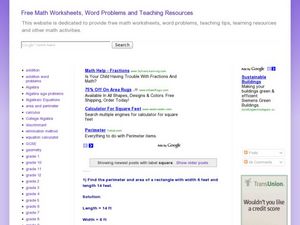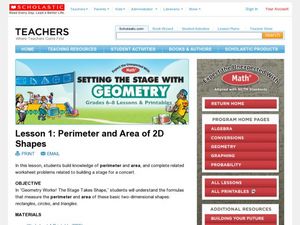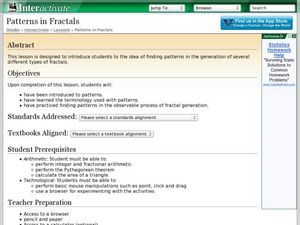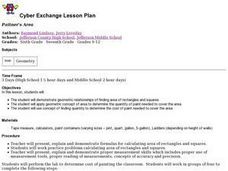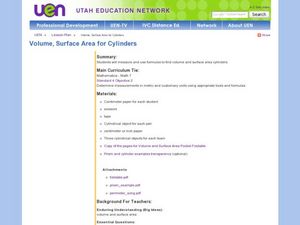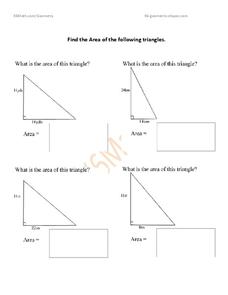Rectangle Teacher Resources
Hi, What do you want to do?
Find Rectangle lesson plans and worksheets
Showing 822 resources
Curated OER
Does the Area of the Quadrilateral Change?
Seventh graders complete activities to further their understanding of area formulas. In this area lesson, 7th graders watch as the teacher uses Polystrips to model parallelograms. Students find the area of a rectangle and answer...
Curated OER
Match the Shapes
In this geometry worksheet, students match shapes that look alike or are the same. Students are given five sets of two shapes each where they are to draw a line from one shape to the corresponding shape that matches it.
Curated OER
Surface Area of Prisms
Students compute surface area and volume of prisms. In this surface area lesson, students find the surface area and volume of rectangular and triangular prisms. Independently, students use their computers to determine the volume,...
Curated OER
Tessellating Tiles
Second graders Make, name and describe, using their own language and the language of geometry, everyday shapes and objects. They create and talk about geometric patterns which repeat (show translation), or which have rotational or...
Curated OER
Tessellations: Use Right Angles To Explain The Tessellation of Objects
Students examine a selection of shapes and identify which shapes tessellate and why. They design and make a pattern which involves translation, reflection, or rotation. Students describe the features of 2-dimensional and 3-dimensional...
Curated OER
Perimeter and Area Practice 2
In this area and perimeter practice worksheet, students examine 4 sample problems and solve 20 problems that require them to calculate perimeter and area.
Curated OER
Quadrilaterals
In this geometry activity, students determine if a figure is a quadrilateral. If so, students continue to answer questions to determine whether it is a square, diamond, rhombus, rectangle, parallelogram or trapezoid.
Curated OER
Calculating Surface Area
In this surface area worksheet, students find the surface are of cubes and rectangular prisms. This one-page worksheet contains 3 problems.
Curated OER
Perimeter and Area of 2D Shapes
Students find the perimeter and area of circles, triangles, and rectangles. In this perimeter and area lesson plan, the teacher gives students formulas for each shape and measurement and works through examples on the board. While no...
Curated OER
Geometric Figures
Young scholars compare, classify and calculate the area of geometric figures such as rectangles, squares, circles and triangles.
Curated OER
Unit Perimeters and Areas
Learners use Geometers SketchPad to find the area and perimeter of several shapes. In this geometry lesson, students determine area of rectangles and progress through irregular polygons. None of the referenced worksheets are included...
Curated OER
Exploring Area
Fifth graders explore the concept of area using the geometry of selected objects. The laboratory for this experience is the classroom. The lesson focuses upon the objects that have four sides like squares and rectangles.
Curated OER
Prime and Composite Numbers
Sixth graders inspect prime and composite numbers. Using graph paper, they draw as many different shaped rectangles as possible. They use the dimensions of the rectangles to discuss prime and composite numbers. Students create a chart...
Curated OER
Measurements in Quilting
Student measure the length of the sides of rectangles and squares using inches, feet and yards. They determine perimeters of rectangles and squares. They then determine areas of rectangles and squares.
Student compare measurement of...
Curated OER
Count the Squares and Compare
Fourth graders construct squares and rectanges in order to help them find areas and perimeters. They gain an understanding of area and perimeter through teacher modeling and then they construct squares and rectangles.
Curated OER
Patterns in Fractals
Students explore the concept of fractal patterns. In this fractal pattern lesson, students use an applet about the Hilbert Curve to answer questions about rectangles and other polygons. Students derive the fractal pattern when dividing...
Curated OER
Painter's Area
Students demonstrate geometric relationships of finding area of rectangles and squares. They apply determine the quantity of paint needed to cover the area by using the concept of quantity.
Curated OER
Finding Areas of Polygons- Extra Practice Worksheet
In this geometry worksheet, students practice finding the area of 11 polygons using diagrams which include units in both standard and metric measurement. They solve for the area of 11 polygons using words that describe the polygons that...
Curated OER
Volume, Surface Area for Cylinders
Seventh graders explore the concept of volume and surface area of cylinders. In this volume and surface area of cylinders lesson, 7th graders break cylinders into their base shapes of a circle and a rectangle. Students discover that...
Curated OER
Dilations of 2 and 3 dimentional figures and their effect on area, surface area, and volume.
Seventh graders investigate the area and volume of 2D and 3D figures. In this geometry lesson, 7th graders create a storyboard explaining their knowledge of 2D and 3D shapes. They analyze their data and interpret their...
Curated OER
Finding Area of Triangles
In this triangle worksheet, students find the area of a set of 4 triangles, writing their answer in a rectangle found beneath each. A reference web site is given for additional activities.
Curated OER
Area of Triangles
In this area worksheet, students calculate the area of 4 triangles, writing answers in rectangles beneath each triangle. A reference web site is given for additional activities.
Curated OER
Area of Triangles
In this area of triangles activity, students calculate the area of 4 given triangles, writing the answers in rectangles beneath each. A reference web site is given for additional activities.
EngageNY
How Do Dilations Map Angles?
The key to understanding is making connections. Scholars explore angle dilations using properties of parallel lines. At completion, pupils prove that angles of a dilation preserve their original measure.





